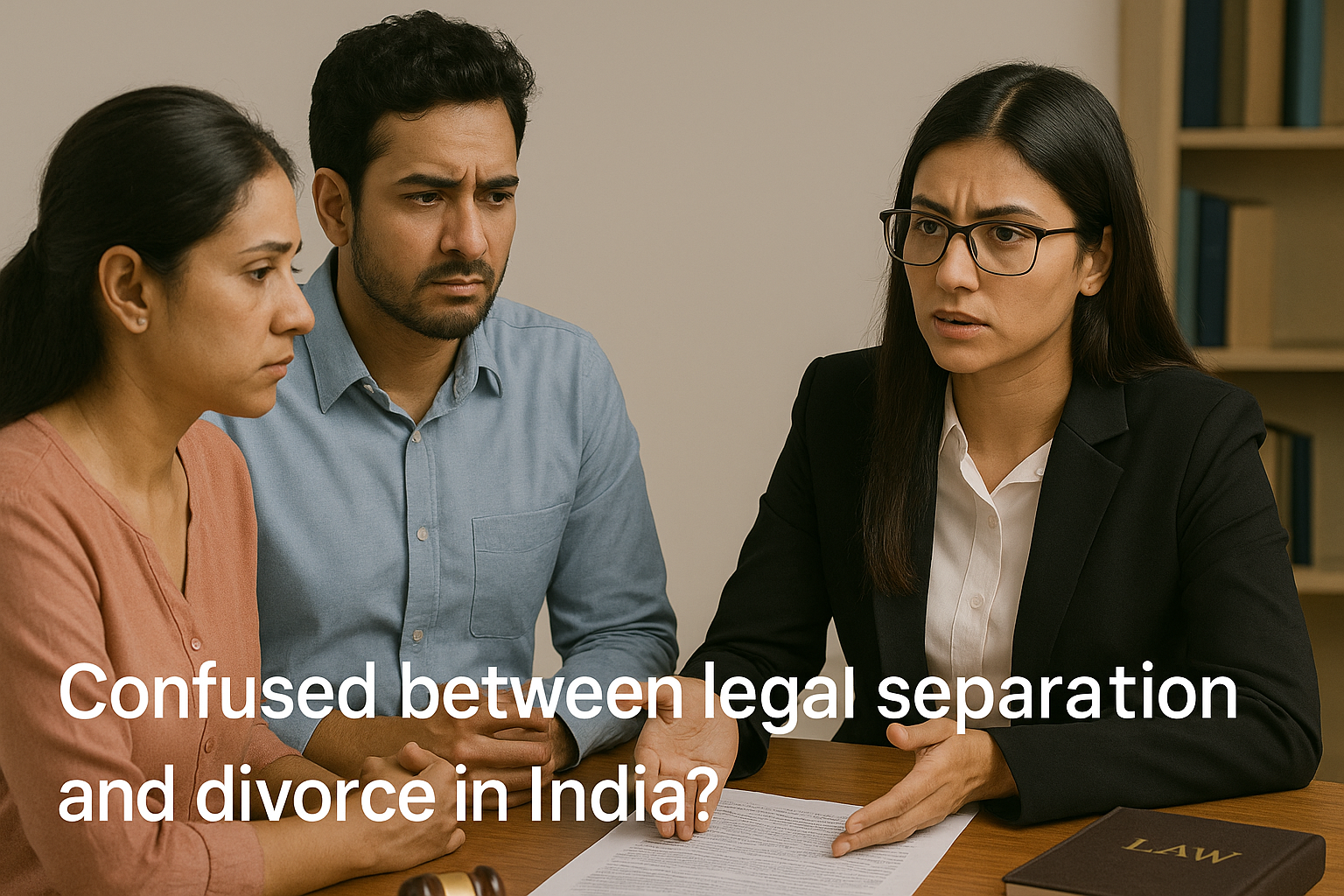· Legal Separation · 4 min read
Understanding Legal Separation vs. Divorce in India: A Lawyer’s Perspective
Confused between legal separation and divorce in India? Get expert insights on the key differences, legal implications, and which option may be right for you.

Understanding Legal Separation vs. Divorce in India: A Lawyer’s Perspective
When couples face serious difficulties in their marriage, one of the toughest decisions they must make is whether to legally separate or proceed with a divorce. As a lawyer who specializes in dispute resolution, I often find that people are unaware of the differences between these two options. While both legal separation and divorce involve emotional and legal complexities, understanding their nuances can help individuals make informed choices aligned with their personal, financial, and legal goals.
In this article, I’ll walk you through the key differences between legal separation and divorce in India, when each may be appropriate, and what legal processes are involved. This clarity can be especially valuable if you are considering either path or advising someone who is.
What Is Legal Separation?
Legal separation in India isn’t formally recognized in the same way as it is in some Western countries. However, Indian courts do provide a remedy called judicial separation, under Section 10 of the Hindu Marriage Act, 1955. This allows married couples to live separately without officially dissolving the marriage.
Judicial separation is essentially a court-sanctioned arrangement where the couple is still legally married but no longer required to live together. It offers the parties space and time to reflect, possibly reconcile, or prepare for a more permanent decision like divorce.
Key Points About Judicial Separation:
It allows for time apart without ending the marriage.
Either spouse can file for judicial separation based on grounds similar to divorce (such as cruelty, desertion, adultery, etc.).
It can be used as a stepping stone before filing for divorce.
Rights and responsibilities regarding children, finances, and property may be addressed in the court’s order.
What Is Divorce?
Divorce is the legal dissolution of a marriage, bringing the relationship to an official end. Once a decree of divorce is granted, both individuals are free to remarry and are no longer legally bound as spouses.
In India, divorce laws vary based on religion. The Hindu Marriage Act, the Muslim Personal Law, the Christian Divorce Act, and the Parsi Marriage and Divorce Act all provide different legal frameworks. Divorce can be granted either:
Mutually, where both parties agree and jointly file for divorce; or
Contested, where one spouse initiates the divorce based on specific legal grounds.
Divorce is a final legal step, and the decision to pursue it should be made carefully, ideally with legal guidance and emotional readiness.
Legal Separation vs. Divorce: Key Differences
Aspect | Legal Separation (Judicial Separation) | Divorce |
|---|---|---|
Marital Status | Still legally married | Marriage legally ended |
Right to Remarry | No | Yes |
Time for Reconciliation | Yes | No |
Grounds Required | Yes, similar to divorce | Yes, based on the applicable law |
Financial/Child Custody | Can be decided by court | Decided as part of divorce proceedings |
When Should You Consider Legal Separation?
Legal separation may be appropriate if:
You need time apart to reassess the marriage.
Religious or cultural reasons prevent you from seeking divorce.
You want to retain benefits of marriage (such as inheritance or tax).
You hope for reconciliation but need legal protection in the interim.
When Divorce May Be the Right Option
Divorce may be the more suitable path if:
There is no hope of reconciliation.
One or both parties wish to remarry.
The marriage has broken down irretrievably.
Continued association leads to emotional or financial harm.
How Dispute Resolution Can Help
As a firm that focuses on resolving issues efficiently and amicably, we at Eresolution offer services such as Mediation and Family Marriage Dispute Resolution to help couples navigate separation or divorce without escalating conflict.
Through structured communication and legal guidance, our goal is to empower individuals to make informed decisions, safeguard their rights, and protect the well-being of any children involved.
Final Thoughts
Whether you’re contemplating a legal separation or divorce, it’s crucial to understand the legal implications of both options. Every relationship is unique, and there’s no one-size-fits-all solution. Legal processes can be daunting, but with the right legal counsel and emotional support, you can make choices that align with your future goals.
If you are currently navigating such a decision or seeking professional support, feel free to reach out. At Eresolution, we are committed to guiding you through this complex journey with sensitivity, clarity, and legal expertise.


.DWA9L4Y3.jpg)